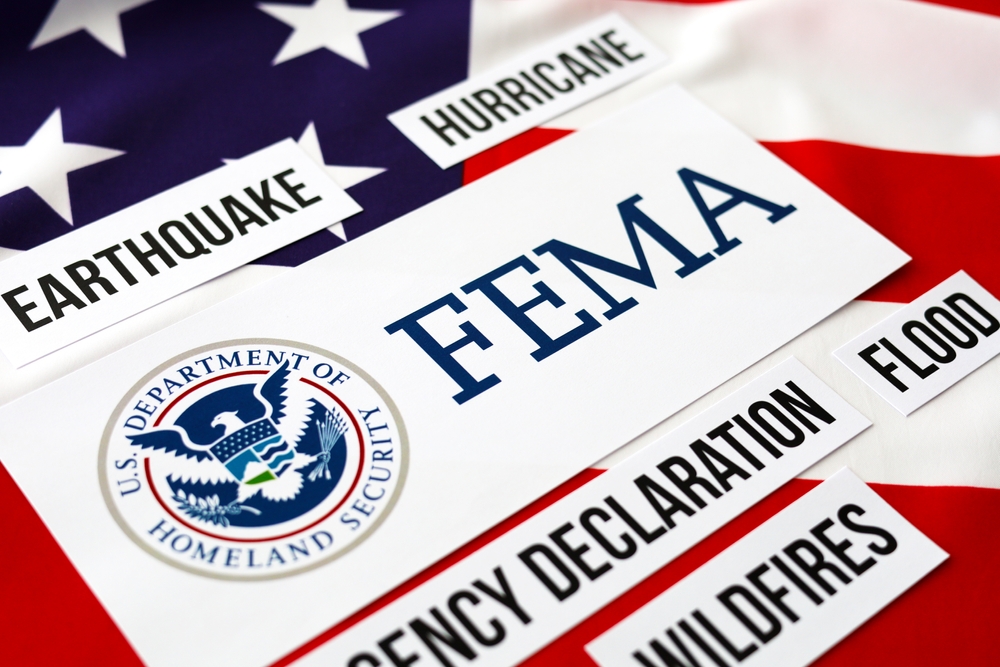“Be prepared” was once just the motto of Boy Scouts across the country. Today, it’s quickly becoming the norm in every household. The year 2023 alone saw hurricanes, wildfires, and several other billion-dollar disasters that affected not just individual homes, but the country at large.
In this ever-changing world marked by the increasing frequency and severity of disasters, both natural and man-made, the demand for skilled professionals in emergency management has never been higher. These dedicated individuals play a crucial role in mitigating the impact of crises, responding effectively when disaster strikes, and helping communities get back on their feet.

If you’re considering a career in this field, it’s important to understand what an emergency management degree is, and whether you should pursue one. In this comprehensive guide, we’ll explore all you need to know about emergency management degrees. Whether you’re motivated by a sense of duty to your community or a passion for crisis management, this article will equip you with the information you need to take a confident step towards a rewarding career in emergency management.
What is Emergency Management?
Emergency management refers to the process of preparing for, responding to, and planning recovery measures for those affected by disasters and emergencies. It involves a range of activities, including planning, training, and coordination, to ensure that communities are able to reduce their vulnerability to hazards and cope with disasters – natural or man-made. Here are some key aspects of emergency management:
Prevention
This involves taking action to avoid certain incidents from occurring. Prevention measures may include deterrence operations, surveillance, and the establishment of building codes and zoning requirements.
Mitigation
This refers to measures that reduce the chance of an emergency happening or reduce the damaging effects of unavoidable emergencies. Typical mitigation measures include installing shutters and constructing barriers such as levees.
Preparedness
This involves activities that increase a community’s ability to respond when a disaster occurs. Typical preparedness measures include setting evacuation plans, planning emergency escape routes, stockpiling essential supplies, training for both response personnel and concerned citizens, conducting disaster exercises to reinforce training and test capabilities, and presenting all-hazards education campaigns.
Response
This involves actions carried out during and immediately after a disaster or emergency. Response activities may include search and rescue operations, evacuation, and the provision of emergency medical care.
Recovery
This involves the process of rebuilding and restoring a community after a disaster or emergency. Recovery activities may include debris removal, rebuilding damaged infrastructure, and providing assistance to affected individuals and families.
In the U.S., the Federal Emergency Management Agency (FEMA), an agency of the Department of Homeland Security (DHS), is the apex agency responsible for coordinating responses to disasters that overwhelm the resources of local and state authorities.
FEMA’s National Preparedness Goal defines what it means for the whole community to be prepared for all types of disasters and emergencies.

Emergency management is a multifaceted field that requires coordination and collaboration among various organizations and stakeholders, including government agencies, non-profit organizations, and private sector entities. The educational opportunities are increasing for those seeking undergraduate and graduate degrees in emergency management or related fields.
What is an Emergency Management Degree?
Emergency management degrees are designed to equip students with the knowledge, skills, and expertise needed to excel in the diverse field of emergency management. An emergency management degree usually offers a structured curriculum that covers a wide range of topics related to disaster preparedness, response, recovery, and mitigation.
Typical emergency management degree programs include courses on subjects such as:
Emergency response operations and techniques
These courses help students build management and supervision skills critical to success in the emergency services environment. The focus is on practices necessary for saving lives, protecting the environment, and providing for the affected populace after a disaster.
Ethics and moral reasoning in emergency management
An emergency management degree may include courses on ethics, in which students examine and evaluate theories and arguments concerning ethics and moral reasoning from a philosophical perspective. These courses help make students more reflective and informed about their own moral beliefs, and develop their capacity for critical reasoning.
Psychological, social, and environmental aspects of disaster response
The coursework may explore the human and societal impacts of disasters, as well as the environmental factors that contribute to their occurrence and effects.
Legal and liability issues
Many emergency management degree programs also include courses that cover the legal framework surrounding emergency management, including regulations, liability, and ethical considerations.
Research methods
These courses examine quantitative, qualitative, mixed methods, and associated data interpretation within the context of research, policy and practice within the social sciences. Students learn to examine types of data, measurement scales, hypotheses, sampling, probability, and varied research designs that can help them make data-driven decisions as emergency management professionals.
The courses included in traditional and online emergency management degree programs vary with each university, and type of program. For instance, some programs may include additional STEM subjects, while others may have more practical work and capstone projects.
Let’s look at a few types of emergency management degrees offered across universities.
Types of Emergency Management Degrees
There are several options available for students interested in pursuing an emergency management degree. There are many types of programs in emergency management, from the associate to master’s level. Here are the most popular academic programs in emergency management:
- Associate Degree in Emergency Management
- Bachelor’s Degree in Emergency Management
- Master’s Degree in Emergency Management
- Doctoral Degree in Emergency Management
- Related Degrees and Certificate Programs in Emergency Management
Associate Degree in Emergency Management
Program Duration (Years):
An associate degree in emergency management typically takes about 2 years of full-time study. Part-time options may also be available, as well as accelerated programs, depending on your university.
Credits Required:
The total number of credits required to earn an associate degree in emergency management can vary depending on the specific program and institution. However, it typically involves completing around 60 credits of coursework.
When pursuing an associate degree in emergency management, you often have the choice between an Associate of Arts (AA) or an Associate of Science (AS) degree. The main difference between these two options lies in the focus of the coursework.
An AA in Emergency Management may include a broader range of liberal arts courses in addition to the core emergency management curriculum. This can provide a more well-rounded education with a focus on communication and critical thinking skills.
An AS in Emergency Management tends to have a more concentrated emphasis on the scientific aspects of emergency management. This option may be preferable if you are particularly interested in the technical and administrative aspects of the field.
Regardless of whether you choose the AA or AS path, an associate degree in emergency Management typically covers a combination of classroom and laboratory courses. These courses are designed to equip you with the knowledge and practical skills needed to effectively respond to emergencies and disasters, create emergency plans, manage resources, and coordinate response efforts. It serves as a foundational step towards building a career in emergency management or advancing to a higher level of education in the field.
Bachelor’s Degree in Emergency Management
Program Duration (Years):
A bachelor’s degree in emergency management is typically completed in about 4 years of full-time study. Part-time and accelerated options may be available to accommodate different schedules.
Credits Required:
Bachelor’s degree programs in emergency management typically require students to complete approximately 120-130 credits of coursework. This usually includes a combination of general education courses, core emergency management courses, capstone courses, and electives.
As with the associate level, you’ll often have the choice between a Bachelor of Arts (BA) or a Bachelor of Science (BS) degree in emergency management.
A BA in Emergency Management may include a few more liberal arts courses in addition to the core emergency management curriculum. This can help improve your communication, critical thinking, and problem-solving skills.
For example: The University of Arizona Global Campus (UAGC) offers a BA in Homeland Security and Emergency Management.
A BS in Emergency Management typically places more focus on the technical and scientific aspects of the field. There may be additional STEM subjects besides the core curriculum. If you are particularly interested in the technical, analytical, and administrative aspects of emergency management, then a BS may be the way to go.
For example: Grand Canyon University (GCU) offers a BS in Homeland Security and Emergency Management.
Regardless of whether you choose the BA or BS path, a bachelor’s degree in emergency management covers a wide range of topics. Students can expect to study emergency planning, risk assessment, disaster response, crisis communication, resource management, and more. Earning a bachelor’s can arm you with the skills and expertise you’ll need to excel in various roles within emergency management.
Master’s Degree in Emergency Management:
Program Duration (Years):
Typically 1.5 to 2 years of full-time study. Some universities offer part-time and online accelerated programs to suit different schedules.
Credits Required:
Approximately 35 to 50 credits. This can vary greatly depending on your university and program.
A master’s degree in emergency management provides advanced training in emergency management, including leadership, policy development, and program evaluation. It prepares students for leadership roles in emergency management, such as emergency management directors or homeland security advisors.
Just as with associate’s and bachelor’s degree programs, you can either opt for an MS or MA in emergency management at the master’s level. Graduates with a Master’s degree in emergency management are well-prepared for leadership roles, policy development, and research positions in various sectors of emergency management.
Doctoral Degree in Emergency Management
Program Duration (Years):
Approximately 3 to 5 years of full-time study
Credits Required:
Typically 55 to 65 credits
Doctoral degrees in emergency management are research-intensive and often require the completion of a doctoral dissertation, which is a substantial research project that contributes to the field’s body of knowledge. These programs provide advanced training in areas such as emergency management theory, research methods, leadership, and policy analysis.
Doctoral degrees in emergency management aren’t as common as associate, bachelor’s, and master’s programs. However, earning a doctorate can make a significant difference if you aim to secure higher positions in emergency management agencies and organizations with similar goals.
Related Degrees and Certificate Programs in Emergency Management
Related Degrees
Some schools offer degrees that are comparable to emergency management programs but don’t have “emergency management” in their titles. For example, degrees in homeland security, public administration, public health, or occupational safety may also provide relevant training for a career in emergency management. Many universities offer criminology or criminal justice degrees with concentrations in homeland security, emergency management, and related subjects, which may be a good option if you’re interested in law enforcement as well. If you’re great with people, you may be suited for a degree in crisis communications – an important area in emergency management.
Many of these academic programs are offered 100% online or through hybrid or self-paced courses that suit different schedules since many students in this field opt to earn experience through projects or internships, often alongside college education. Pursuing an online emergency management degree may be a great option if you have a busy schedule that traditional colleges might not be able to accommodate.
Certificate Programs in Emergency Management
Certificate programs provide specialized training in emergency management, often in a specific area, such as disaster response or risk assessment. They are designed for professionals who want to enhance their skills or those who wish to enter the field of emergency management.
Many universities offer certificate programs that help students start or advance their emergency management careers. These programs aim to help students understand how emergency management works. They often include practical training to get students career-ready for roles across the emergency management landscape.
Besides universities, many agencies and government bodies offer training programs through which you can earn recognized certification in certain areas of emergency management. For instance, the Emergency Management Institute (EMI) offers self-paced training programs designed for people with academic/business continuity and emergency management responsibilities. Many of these courses are provided free of charge. A few organizations require you to earn such certifications before you start your professional journey in the field. You can also refer to the National Preparedness Course Catalog for information on emergency management courses compiled to meet the increasing training needs of federal, state, local, territorial, and tribal audiences.
It’s worth noting that the specific types of emergency management degrees offered may vary by school. But no matter what program you opt for, earning a degree or certificate in emergency management will likely serve you better than diving directly into a career in the field.
Concentrations in Emergency Management
Emergency management degree programs usually offer concentrations or emphases that allow students to specialize in a particular area of emergency management. Here are some popular concentrations offered through emergency management degrees:
- Homeland Security
- Child Protection
- Fire Science
- Public Administration
- Disaster Preparedness
Homeland Security
This concentration focuses on the prevention and response to terrorist attacks and other threats to national security. Students learn about intelligence gathering, risk assessment, cybersecurity, and the coordination of federal, state, and local agencies.
Child Protection
This concentration focuses on the unique needs of children during disasters and emergencies. Students learn about child development, child psychology, and the legal and ethical considerations of working with children in emergencies.
Fire Science
This concentration focuses on the role of firefighters and other first responders in emergency management. Students learn about fire behavior, fire suppression techniques, and the use of specialized equipment and technology.
Public Administration
This concentration focuses on the management and coordination of emergency management programs at the local, state, and federal levels. Students learn about budgeting, policy development, and interagency coordination.
Disaster Preparedness
This concentration focuses on the planning and preparation for disasters and emergencies. Students learn about risk assessment, emergency planning, and developing emergency response plans.
The concentrations offered through emergency management programs vary with each university. Additionally, some programs may offer a more general curriculum that covers a broad range of emergency management topics rather than a specific concentration.
Accreditation in Emergency Management Education
When you’re considering an emergency management degree, you should ideally opt for an accredited program. Here’s why accreditation matters:
What is Accreditation?
Accreditation is a formal evaluation process conducted by independent organizations. These organizations assess educational institutions and programs to determine if they meet specific quality standards. In the context of emergency management education, accreditation ensures that the program provides a solid foundation of knowledge and skills needed in the field.
Broadly, accreditation can be either regional/institutional or programmatic accreditation.
Institutional or regional accreditation is when an entire college or university is accredited by a national or regional accreditation body. Make sure your university is accredited by institutional accrediting agencies recognized by the U.S. Department of Education. Programmatic accreditation applies to specific degree programs or courses. It can prove beneficial to enroll in a program that has been accredited by any programmatic accrediting agencies recognized by the U.S. Department of Education.
Why is Accreditation Important?
Here’s how accreditation can make a difference:
Quality Assurance:
Accreditation assures you that the program you’re considering meets established quality standards. This means you can usually trust that you’re receiving a high-quality education.
Employability:
Many employers prefer to hire candidates who have graduated from accredited programs because accreditation implies that these graduates have received a rigorous and relevant education.
Transfer Credits:
If you decide to continue your education or transfer to another school, accredited programs often make it easier to transfer your credits.
How Do You Check Accreditation?
To ensure that an emergency management program is accredited, you can follow these steps:
- Check the Program’s Website:
Most accredited programs proudly display their accreditation status on their websites. Look for information about accreditation and the accrediting body.
- Use Accreditation Databases:
Accrediting bodies often maintain online databases of accredited programs. You can search these databases to verify the status of a program you’re interested in.
- Contact the School:
If you’re unsure about a program’s accreditation, don’t hesitate to contact the school’s admissions or academic affairs office. They should be able to provide you with the information you need.
Accreditation is an important factor to consider, especially when pursuing online programs. Not all agencies and settings require accredited degrees in emergency management, but it’s generally better to pursue programs that hold some accreditation, either by regional accrediting bodies or professional organizations that evaluate collegiate education in emergency management.
What can you do with an Emergency Management Degree?
Earning a degree in emergency management opens doors to a diverse array of career opportunities, allowing individuals to contribute in areas across the emergency management landscape. While many graduates aim for careers as emergency management directors, there are plenty of other career paths you can pursue after earning your degree. Here are a few popular career paths to choose from after completing your emergency management degree:
- Government Agencies
- Nonprofit and Humanitarian Organizations
- Private Sector
- International Organizations
- Disaster Recovery
- Environmental and Sustainability Roles
- Academia and Research
Government Agencies
Government agencies at various levels, from national agencies such as the Federal Emergency Management Agency (FEMA), the Department of Homeland Security (DHS), to state emergency management agencies, and local emergency services, hire professionals in diverse roles. Alabama, like most other states, has its own state-level Emergency Management Agency. To find out the office to contact in your state, you can check the official directories for State emergency management agencies (usa.gov) and State Homeland Security and Emergency Services (dhs.gov).
Nonprofit and Humanitarian Organizations
Many nonprofit organizations and humanitarian agencies require emergency management expertise to respond to disasters around the world. This includes organizations like the Red Cross, Save the Children, and Médecins Sans Frontières (Doctors Without Borders).
Private Sector
Modern businesses and corporations have started to recognize the importance of emergency preparedness. That’s why official literature, like the Occupational Safety and Health Administration’s (OSHA) guidelines for emergency preparedness, now includes information on workplace emergencies and how businesses need to consider implementing emergency plans. Large companies often employ emergency management professionals to develop and implement business continuity plans, ensuring that operations can continue during and after disasters.
International Organizations
Those with a global perspective may find fulfilling careers in international organizations such as the United Nations (UN), United Nations Children’s Fund (UNICEF), or the World Health Organization (WHO), where they can contribute to emergency prevention and response efforts on a global scale. Many international NGOs and nonprofits also offer similar roles that emergency management graduates may be eligible for.
Disaster Recovery
Disaster recovery managers are responsible for coordinating recovery efforts, assessing damage, and working with communities to rebuild after a disaster. With the increase in man-made and natural disasters in recent years, disaster recovery has become an extremely important part of the modern emergency management system and is crucial in helping affected areas return to normalcy.
Environmental and Sustainability Roles
As environmental concerns grow, there is a growing need for emergency management professionals who can address environmental disasters like oil spills, chemical accidents, and climate-related events. Many emergency management graduates work in organizations focused on sustainability and environmental concerns.
Academia and Research
Some emergency management graduates pursue careers in academia, teaching future emergency management professionals or conducting research to advance the field’s knowledge base. They may work in universities or research institutions.
These are just a few examples of the numerous career paths available to individuals with emergency management degrees. Emergency management is a diverse, multifaceted field, with distinct career paths. Whether you aspire to work in government bodies, the private sector, nonprofit organizations, academia, or international agencies, the skills gained through emergency management education are in high demand, making it a dynamic and rewarding field to pursue.
Building relevant experience can be valuable, and you can do this by applying for emergency management internships.
Internships in Emergency Management
Internships aren’t always required for emergency management careers. But they can be beneficial for gaining experience and building a professional network. Some emergency management agencies or offices may require interns to complete an internship program before being considered for employment. However, this varies depending on the specific agency or office.
Most local and state agencies offer internships or actively recruit volunteers for various projects. These internships may not always be paid, but can help you build relevant skills in the field. The Massachusetts Emergency Management Agency (MEMA) offers paid emergency management internships for college students in the spring and summer, each requiring about 20 hours a week.
Many emergency management degree programs include internships as part of the regular coursework. These may not always be required, but are certainly recommended. Your university may also offer voluntary emergency management internships, which may be open to students across degree levels. The Florida State University’s Emergency Management Internship Program is an example of this. Through it, college-level students and recent FSU graduates can gain hands-on experience in fields such as emergency management, public administration, emergency planning, emergency operations, communications, and community preparedness.
Besides helping you build a professional network, internships can provide you with valuable experience in the field, allowing you to gain hands-on experience, in-depth knowledge, and training opportunities. Many internships also lead to full-time career opportunities.
For all these reasons, if you’re pursuing a degree in emergency management and want to build a career in the field, then an internship is worth considering.
Conclusion
In a world where emergencies and disasters are becoming more common, the job of emergency management professionals is incredibly important.
As you think about your path in emergency management, remember that it’s not just a job; it’s a chance to make a real difference. It’s an opportunity to help people and communities when they need it most.
Choosing a degree in emergency management means choosing a career where you can truly make a positive impact. Whether you’re focused on a specific area, doing research, or leading teams, know that your role in emergency management matters, and the work you do will be valued and appreciated.
The value of a degree in emergency management depends on your individual goals and circumstances. If you are passionate about helping communities prepare for and respond to disasters, enjoy problem-solving, and want to make a positive impact during emergencies, an emergency management degree can be highly rewarding. However, like any educational investment, it’s essential to consider factors such as program quality, accreditation, and career prospects to determine if they align with your aspirations and provide a solid return on investment.
Yes, many universities and colleges offer online emergency management degrees. Online education provides flexibility, allowing you to pursue your degree while balancing work or other commitments. Some schools also offer hybrid and self-paced courses, which can fit your schedule.



